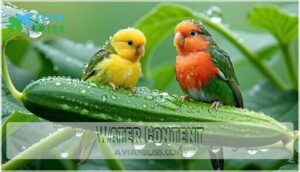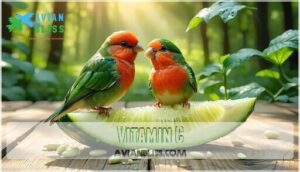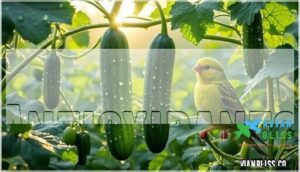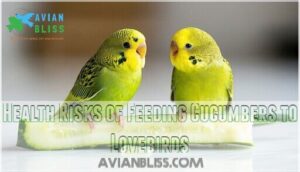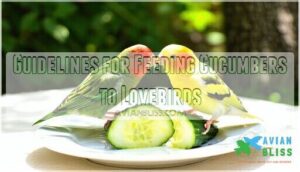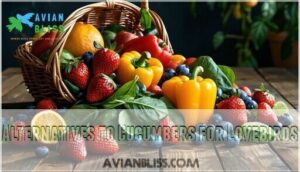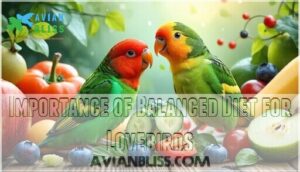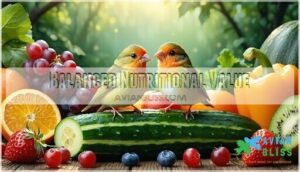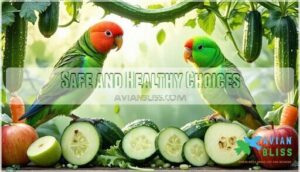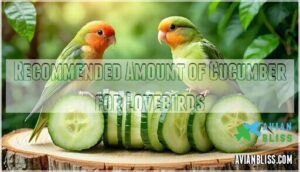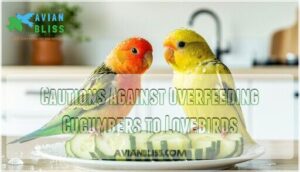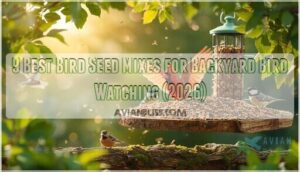This site is supported by our readers. We may earn a commission, at no cost to you, if you purchase through links.
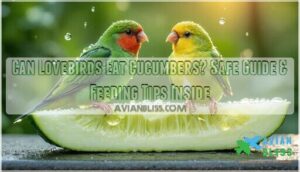
Cucumbers pack plenty of water and vitamin C, making them perfect for hydration on hot days. However, you’ll need to remove the seeds first since they can cause digestive upset.
Wash the cucumber thoroughly, peel if it’s not organic, and cut it into small, bird-safe pieces. Limit cucumber treats to once or twice weekly – too much can lead to watery droppings due to the high water content.
Your feathered friend will likely love the crisp texture and mild flavor. The key is balance alongside their regular pellet diet and other fresh vegetables for ideal nutrition.
Table Of Contents
- Key Takeaways
- Can Lovebirds Eat Cucumbers?
- Nutritional Value of Cucumbers for Lovebirds
- Health Risks of Feeding Cucumbers to Lovebirds
- Guidelines for Feeding Cucumbers to Lovebirds
- Alternatives to Cucumbers for Lovebirds
- Importance of Balanced Diet for Lovebirds
- Best Snack Options for Lovebirds
- Recommended Amount of Cucumber for Lovebirds
- Cautions Against Overfeeding Cucumbers to Lovebirds
- Frequently Asked Questions (FAQs)
- Conclusion
Key Takeaways
- You can safely feed cucumbers to your lovebird, but remove the seeds first – the seeds can cause digestive upset and blockages since they’re difficult for lovebirds to process properly.
- Limit cucumber treats to 1-2 small pieces twice weekly, maximum – too much can cause watery droppings and digestive issues due to the 96% water content.
- Always wash thoroughly and peel the skin before serving – this removes pesticide residues, wax coatings, and other harmful chemicals that can threaten your bird’s health.
- Use cucumbers as hydrating treats, not meal replacements – they provide water and some vitamin C, but lack the complete nutrition your lovebird needs from pellets and varied fresh foods.
Can Lovebirds Eat Cucumbers?
Yes, lovebirds can safely eat cucumbers as part of their diet. These crunchy vegetables offer hydration and nutrients, but they’re not a meal replacement for your feathered friend’s balanced nutrition.
Cucumbers are 96% water, making them excellent for keeping your lovebird hydrated. However, this high water content means you’ll need to watch safe quantities. Too much can lead to runny droppings or digestive issues.
Hydration yes, moderation essential – too much cucumber equals digestive trouble for your feathered friend.
When introducing cucumbers to picky eaters, start small. Some birds love them immediately, while others need time to warm up to new lovebird treats. Watch for cucumber allergies – unusual behavior or reluctance to eat might signal sensitivity.
Cucumber benefits include vitamins A, C, and K, plus minerals that support your bird’s health. Choose organic cucumbers when possible, or wash store-bought ones thoroughly to remove wax and pesticides.
Remember that cucumbers should complement, not replace, your lovebird’s main diet of pellets and seeds. These safe vegetables work best as occasional treats in a well-rounded lovebird diet. Proper preparation methods and moderation keep your bird healthy and happy, ensuring a balanced nutrition and a healthy and happy life.
Nutritional Value of Cucumbers for Lovebirds
Looking at cucumbers as a snack for your lovebird reveals some impressive nutritional benefits that make them worth considering.
These green vegetables pack essential vitamins and minerals while providing excellent hydration support for your feathered friend, making them a great choice with impressive nutritional value.
Water Content
Approximately 95% water makes cucumbers an excellent hydration source for your lovebird’s diet.
This natural water absorption helps maintain proper electrolyte balance and supports kidney function during warm weather.
Meeting a lovebird’s vitamin and mineral requirements is essential for their overall health.
- Natural hydration – Refreshes birds without forcing water consumption
- Electrolyte maintenance – Supports proper mineral balance in small bodies
- Kidney support – Aids natural filtration processes through gentle hydration
- Diarrhea risk – Excess cucumber can cause loose droppings in lovebirds
Vitamin C
Cucumbers provide vitamin C for immune support in your lovebird’s diet.
While containing modest levels (2.8 mg per 100g), this nutrient helps prevent deficiency symptoms like weakened immunity.
Raw cucumbers for lovebirds offer better vitamin C than cooked vegetables.
However, absorption factors like freshness matter—older produce loses potency.
Avoid supplementation risks by using whole food sources.
| Vitamin C Content | Daily Needs | Cucumber Serving |
|---|---|---|
| 2.8 mg per 100g | 10-30 mg | Small supplement only |
| Fresh is best | Varies by bird | 1-2 small slices |
| Raw preferred | Multiple sources needed | Part of lovebird nutrition |
Antioxidants
Beyond vitamin C, cucumber skin delivers antioxidants like beta-carotene and flavonoids that work hard for your lovebirds diet.
These compounds tackle cellular health challenges:
- Immune Support – Fighting viruses and infections naturally
- Oxidative Stress reduction – Protecting cells from daily damage
- Inflammation Reduction – Supporting overall wellness
While cucumber nutrition offers moderate antioxidants compared to leafy greens, it’s still valuable for lovebird food variety.
Health Risks of Feeding Cucumbers to Lovebirds
While cucumbers are generally safe for lovebirds, you’ll want to watch for a few potential issues that can arise from feeding them.
The high water content can lead to digestive problems like diarrhea if you offer too much, and some birds may struggle with the small seeds inside.
Excess Water Content
Cucumbers contain about 95% water, which sounds invigorating but creates diarrhea risk and bloating potential for your lovebird.
This high water content disrupts hydration balance and causes nutrient dilution in their lovebirds diet.
Too much water leads to loose droppings and electrolyte imbalance.
While cucumber benefits include vitamins, prioritize lovebird health by limiting portions.
Your bird digestion needs balance, not water overload.
Dietary changes may induce excessive drinking periods.
Seed Digestibility
The tiny cucumber seeds pose real challenges for your lovebird’s digestive system.
Unlike their natural diet, these seeds can cause blockages or crop discomfort due to poor digestibility.
Seed hulling isn’t something lovebirds naturally do with cucumber seeds, making enzyme activity insufficient for proper breakdown.
While sprouted seeds from soaking might seem beneficial, cucumber seeds don’t offer the soaking benefits found in bird-appropriate seeds.
Your lovebird digestive system simply wasn’t designed for these particular seeds.
Always remove cucumber seeds before serving to maintain ideal digestive health and prevent bird digestion issues that could harm your feathered friend.
Guidelines for Feeding Cucumbers to Lovebirds
Now that you know cucumbers are safe for your lovebird, you need to follow some simple rules to keep them healthy.
The right way to serve cucumbers makes all the difference between a nutritious treat and a potential problem.
Frequency of Offering
Your lovebird’s cucumber treat frequency matters for balanced nutrition.
Balance cucumber treats weekly – your lovebird’s health depends on moderation, not daily indulgence.
Offer cucumber slices once or twice weekly as an occasional treat, not daily.
This rotation schedule prevents overreliance on any single food.
Monitor your bird’s response through observational feeding – some lovebirds love cucumbers while others prefer different treats.
Keep weekly servings small and remember cucumbers complement your lovebird feeding guide, not replace essential foods.
Organic Vs. Non-organic
When choosing between organic and non-organic cucumbers for your lovebird, organic wins hands down.
These pesticide-free options eliminate harmful chemical exposure that can threaten your bird’s delicate system. Non-organic varieties often carry residues despite washing, making organic the safer long-term health choice.
You can easily find these cucumbers at many retailers. While organic costs more upfront, it’s smart lovebird care that protects against pesticide exposure risks.
Skin Removal
When preparing cucumbers for your lovebird, peeling the skin is essential for safe foods for birds.
The skin often contains wax and pesticide residue that can harm your feathered friend.
Here’s why peel removal matters for lovebird care:
- Pesticide concerns – Non-organic cucumbers carry harmful chemicals
- Wax removal prevents digestive issues in small birds
- Taste preference – Most birds enjoy the crisp flesh better
- Skin benefits are minimal compared to pesticiefree flesh
- Organic options still need peeling for ideal vegetables preparation
To minimize risks, consider using an organic wash product.
Portion Control
Control portion sizes to keep your lovebird healthy. Offer cucumber pieces no bigger than your thumbnail twice weekly maximum.
This prevents digestive upset while maintaining food variety. Small portions equal big benefits – think quality over quantity when feeding lovebirds.
Tomatoes, however, can provide vitamins for immune support.
Remember, cucumbers should stay under 10% of daily intake for ideal bird diet balance.
Alternatives to Cucumbers for Lovebirds
While cucumbers make a rejuvenating treat for your lovebird, you shouldn’t limit yourself to just one veggie option.
Your feathered friend will benefit from a colorful variety of safe fruits and vegetables that offer different nutrients and textures to keep mealtime exciting.
Variety in Diet
Your feathered friend thrives on dietary enrichment beyond cucumbers.
Offering lovebird diet variety prevents boredom and maintains nutritional balance through diverse lovebird vegetable options.
- Rotate safe lovebird vegetables weekly – carrots, bell peppers, broccoli
- Introduce novel foods gradually for acceptance
- Vary food presentation – whole, chopped, or cooked for foraging opportunities
Benefits of Other Fruits and Vegetables
Beyond cucumbers, leafy green benefits shine through kale and spinach’s calcium-rich profiles.
Red bell peppers deliver vitamin C that surpasses cucumber content.
Safe veggies like carrots boost beta-carotene for sharp vision.
Fruit variety through berries adds antioxidants your bird craves.
Herb nutritional value from basil supports digestion.
These lovebird vegetable options create balanced lovebird nutrition through thoughtful lovebird diet variety.
Importance of Balanced Diet for Lovebirds
You’ll want to create a balanced diet that goes beyond just pellets or seeds to keep your lovebird healthy and happy.
A proper mix of formulated foods, fresh fruits, vegetables, and occasional treats provides the variety and nutrition your feathered friend needs to thrive.
Natural Vs. Formulated Diets
When exploring what lovebirds eat, you’ll find two main diet approaches that work together beautifully.
Natural ingredients from fresh food sources provide essential nutrients your bird craves.
Meanwhile, formulated diets with synthetic vitamins guarantee complete nutrition.
A balanced avian diet is vital for their health.
Here’s your lovebird food list breakdown:
- Wild seed mixes – Natural ingredients but limited diet diversity
- High-quality pellets – Synthetic vitamins with balanced pellet quality
- Fresh vegetables – Safe vegetables for birds with amazing vegetable benefits
- Fruit treats – Natural sugars for occasional rewards
Smart bird owners combine both approaches for ideal bird diet diversity.
Inclusion of Seeds, Fruits, and Vegetables
While formulated diets form your lovebird’s foundation, seeds, fruits, and vegetables add vital variety to what lovebirds eat.
These safe vegetables for birds deliver fiber, vitamins, and natural flavors your pet craves. Consider seed nutritional value alongside fruit sugar content when planning meals.
Proper vegetable preparation methods guarantee maximum benefits. Include safe flower options and explore herb flavor profiles for healthy treats that mirror their wild diet perfectly.
Best Snack Options for Lovebirds
When choosing snacks for your lovebird, you’ll want options that provide nutritional benefits without compromising their health.
The best treats include fresh fruits like bananas and mangos, vegetables such as carrots and broccoli, and small amounts of nuts like almonds for training rewards.
Balanced Nutritional Value
Achieving nutritional balance for your lovebird means mixing various foods smartly.
Dietary diversity guarantees proper nutrient ratios – think leafy greens for vitamin sources, carrots for beta-carotene, and berries for antioxidants.
Balance high-water foods like cucumbers with nutrient-dense options. Monitor mineral intake through varied vegetables while maintaining calorie balance.
A lovebird balanced diet combines pellets, fresh produce, and occasional treats for superior lovebird nutrition. You can find products for a lovebird’s nutritional needs.
Safe and Healthy Choices
When choosing safe foods for your lovebird, stick to proven options that support lovebird health.
Safe veggies like chopped kale, romaine lettuce, and steamed carrots provide essential nutrients. Apple slices work great too—just remove those seeds first since they’re toxic foods.
Seed variety matters, so offer millet sprays occasionally. Nut nutritional benefits come from unsalted almonds given sparingly.
Fresh herb benefits include basil and cilantro for flavor. Always consult your vet about lovebird nutrition choices.
Recommended Amount of Cucumber for Lovebirds
Measure your lovebird’s cucumber portions carefully to maintain proper dietary balance. These healthy treats shouldn’t exceed specific daily limits to prevent digestive issues.
- Cucumber portioning: Limit portions to 15% of your bird’s body weight (6.75-11.5 grams for typical lovebirds)
- Slice size control: Offer 1-2 small pieces as an occasional treat within their varied diet
- Food combination strategy: Balance cucumber with pellets (60-80% of diet) for ideal dietary moderation and portion control
Cautions Against Overfeeding Cucumbers to Lovebirds
Too much cucumber can upset your lovebird’s delicate system.
Bloating Concerns and Diarrhea Risk top the list since cucumbers are mostly water.
Your bird’s lovebird digestive system isn’t built for excessive moisture.
Watch for Allergic Reactions like unusual behavior or Appetite Loss.
The lovebird high water content can trigger Digestion Issues and lovebird laxative properties may cause loose droppings, disrupting healthy lovebird dietary habits.
Frequently Asked Questions (FAQs)
Do lovebirds eat cucumbers?
Yes, lovebirds can eat cucumbers! They’re 96% water, making them great for hydration. Feed organic ones when possible, wash store-bought cucumbers thoroughly, and offer just 1-2 small pieces in moderation.
Do birds eat cucumbers?
Many birds do eat cucumbers.
You’ll find that backyard birds like robins, cardinals, and finches enjoy cucumber slices.
They’re drawn to the high water content and mild taste, making cucumbers a cooling treat during hot weather.
Can lovebirds eat seeds?
Lovebirds can eat seeds, but they’re high in fat and low in essential nutrients.
You’ll want to offer them sparingly as treats, not staples.
Focus on pellets, fruits, and veggies instead.
Can lovebirds eat fruit?
**Can your feathered friend enjoy nature’s candy?
Absolutely! You can offer your lovebird fresh fruits like bananas, mangos, and kiwis.
However, keep portions small since fruits contain high sugar levels.
Always remove seeds and pits first—they’re toxic to birds.
Can lovebirds eat lettuce?
Lettuce isn’t toxic to lovebirds, but it’s mostly water with little nutritional value. You’d be better off offering nutrient-dense leafy greens like kale or spinach instead for your bird’s health.
What foods do lovebirds eat?
Picture your lovebird as a tiny rainbow seeking colorful treasures.
You’ll feed them pelleted food as their foundation, then add fresh fruits like bananas and mangos, plus vegetables such as carrots and broccoli.
They’ll also enjoy occasional nuts and seeds for variety.
Can birds eat raw cucumber?
Yes, birds can safely eat raw cucumber. It’s 96% water, making it great for hydration. Wash thoroughly first, and offer small pieces since it’s low in nutrients but filling.
Can lovebirds eat anything?
While you might worry lovebirds can’t eat much, they’re actually quite adaptable.
You can safely offer them various fruits, vegetables, nuts, seeds, and herbs in moderation alongside their main pelleted diet.
What vegetables can love birds eat?
Your lovebird can safely enjoy carrots, broccoli, bell peppers, celery, green beans, spinach, kale, parsley, and cooked sweet potatoes.
Always wash vegetables thoroughly and offer them fresh or lightly steamed for maximum nutrition.
Can birds eat cucumber skin?
Don’t judge a book by its cover – cucumber skin’s perfectly safe for your feathered friend.
You’ll want to wash it thoroughly first, removing any wax coating from store-bought cucumbers to keep your bird healthy.
Conclusion
Remember that lovebirds can eat cucumbers safely when prepared correctly, offered moderately, and balanced with proper nutrition.
You’ve learned the importance of removing seeds, washing thoroughly, and limiting portions. Fresh vegetables like cucumbers provide hydration and vitamins but shouldn’t replace their main diet.
Keep treats to twice weekly maximum. Your lovebird will thrive with variety, balance, and careful attention to their dietary needs for peak health.

